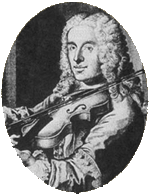

Italian composer, He was instructed in Florence by his uncle Antonio Veracini, and by Giovanni Maria Casini, Francesco Feroci, and G. A. Bemabei. In 1711 and 1712 he played violin in Venice at St. Mark's and S. Maria Gloriosa dei Frati. In spring 1712 his oratorio Il trionfo della innocenza patrocinata da S. NiccoIò was performed in Florence. From January 23 to December 24, 1714 he was in London, where he played in benefit concerts and as soloist at the Queen's Theatre. After time in Düsseldorf and Venice, he became employed at the Dresden court in 1717. From 1723 to 1733 he was again in Florence. He returned to London in 1733 and gave many concerts; he began playing for the Opera of the Nobility, Handel's rival, which presented his first three operas (1735 -38), In 1744 he published his greatest violin sonatas, the Sonate accademiche op. 2. He returned to Florence in the 1750s, serving as maestro di cappella at S. Pancrazio from 1755 until his death. He continued to play violin in his old age. Veracini's compositions include four operas, eight oratorios (now lost), Masses, motets, vespers, a Te Deum, cantatas, songs, sonatas, and concertos.